

THEMES. TLRP’s evidence-informed pedagogic principles (pdf version) TLRP developed an analysis of the research projects into what were called evidence-informed principles for teaching and learning or pedagogies.
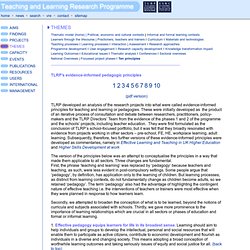
These were initially developed as the product of an iterative process of consultation and debate between researchers, practitioners, policy-makers and the TLRP Directors’ Team from the evidence of the phases 1 and 2 of the programme and the schools’ projects, including teacher education. Blended and Flexible Learning - principles. The principles of good practice in Blended and Flexible Learning (BFL) at CSU are informed by CSU's values (collaborative, student-centred, agile, agents of change, reliable, inclusive) and Strategic Plan (2011-15) and the CSUDegree framework.
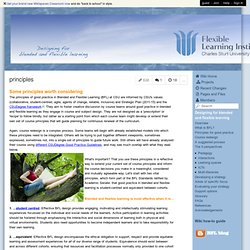
They aim to foster creative discussion by course teams around good practice in blended and flexible learning as they engage in course and subject design. They are not designed as a 'prescription' or 'recipe' to follow blindly, but rather as a starting point from which each course team might develop or extend their own set of course principles that will guide planning for continuous renewal of the curriculum.
Again, course redesign is a complex process. Some teams will begin with already established models into which these principles need to be integrated. Others will be trying to pull together different viewpoints, sometimes expressed, sometimes not, into a single set of principles to guide future work. What's important? Research-Based Learning Principles - Joseph Jay Williams. Meta-discussion of Learning & Education Research Willingham, D.
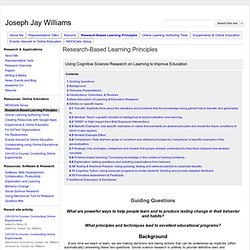
T. (2012). When can you trust the experts: How to tell good science from bad in education. 8 Powerful Principles for Learning. [Click here to listen to the podcast of this post.]
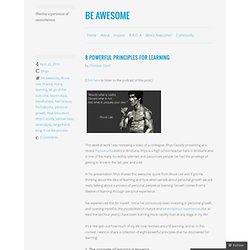
This week at work I was reviewing a video of a colleague, Rhys Cassidy presenting at a recent PechaKucha event in Brisbane. Rhys is a high school teacher here in Brisbane and is one of the many incredibly talented and passionate people I’ve had the privelege of getting to know in the last year and a bit. In his presentation Rhys shared this awesome quote from Bruce Lee and it got me thinking about the idea of learning and how when we talk about personal growth, we are really talking about a process of personal, perpetual learning. Principles of Learning and Teaching - Trinity Catholic College. Our community is committed to excellence in learning and teaching in our contemporary world, and our consistently strong academic results speak for themselves.
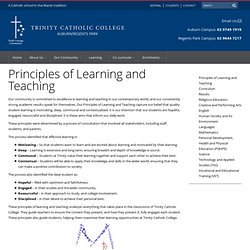
Our Principles of Learning and Teaching capture our belief that quality student learning is motivating, deep, communal and contextualised. It is our intention that our students are hopeful, engaged, resourceful and disciplined. It is these aims that inform our daily work. 12 Principles Of Mobile Learning. 12 Principles Of Mobile Learning by Terry Heick Ed note: This post has been updated and republished from a 2012 post.
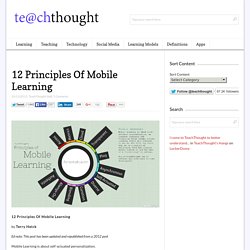
The Model>Principles of Learning: Summary. The latest gains in the field of brain research cast a new light upon the learning process, which impacts curriculum design, teacher preparation, and classroom practices (Bransford, Brown, & Cocking, 1999).
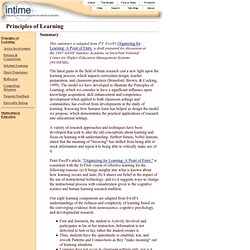
The model we have developed to illustrate the Principles of Learning, which we consider to have a significant influence upon knowledge acquisition, skill enhancement and competence development when applied to both classroom settings and communities, has evolved from developments in the study of learning. Knowing how humans learn has helped us design the model we propose, which demonstrates the practical applications of research into educational settings.
Www.learning-by-design.com/papers/princ_of_effective_learn.pdf. Seeing Learning » Brain/Mind Principles. The principles are summarized below.
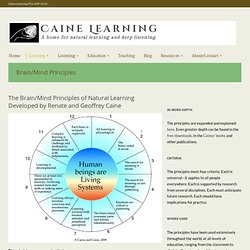
The 12 brain/mind learning principles were first published in Educational Leadership in 1990, and then expanded in depth in our best selling book, Making Connections: Teaching and the Human Brain (1991, 1994). They provided the foundations for what was called brain based learning and is now better known as natural learning. The principles have been largely confirmed by research over the last two decades. Principles of Learning. The Principles of Learning are condensed theoretical statements summarizing decades of learning research.
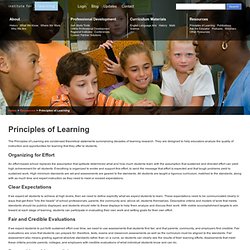
They are designed to help educators analyze the quality of instruction and opportunities for learning that they offer to students. Organizing for Effort An effort-based school replaces the assumption that aptitude determines what and how much students learn with the assumption that sustained and directed effort can yield high achievement for all students. Everything is organized to evoke and support this effort, to send the message that effort is expected and that tough problems yield to sustained work.
Www.ascilite.org.au/conferences/coffs00/papers/ron_oliver_keynote. Www.sagepub.com/upm-data/23144_Chapter_2. Teaching and Learning Principles « Show Me WOW! “I strongly believe that both teaching and learning should be joyful and effective.” says Chris Lawrence.
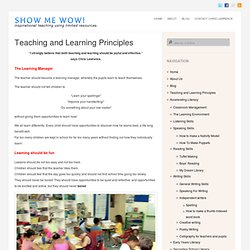
The Learning Manager The teacher should become a learning manager, whereby the pupils learn to teach themselves. The teacher should not tell children to “Learn your spellings!” “Improve your handwriting!” Without giving them opportunities to learn how! We all learn differently. Www.ibe.unesco.org/publications/educationalpracticesseriespdf/prac07e. What Are The Key Principles Of Learning I Should Be Aware Of? Learning is a very complex topic, eg when a psychologist talks about 'learning' he can be referring to any type of behaviour from simple arithmetic to designing a computer system.
Teaching, Learning and Assessment Principles - K-10 Assessment Outline. The Principles of Teaching, Learning and Assessment focus on the provision of a school and class environment that is intellectually, socially and physically supportive of learning. The principles assist whole-school planning and individual classroom practice. It is essential, therefore, to ensure that there is a shared understanding of them within particular school communities and a collaborative effort to implement these principles in ways appropriate to individual schools. Learning experiences should enable students to observe and practise the actual processes, products, skills and values that are expected of them.
Students should have the opportunity to engage fully with the concepts they are expected to develop; observe people engaged in the processes which they are to learn; and encounter examples of high-quality products of those processes, so they can see what it is they are aiming to achieve. Learning is likely to be enhanced when students engage actively with the task at hand. Learning and teaching principles. Www.cshe.unimelb.edu.au/resources_teach/framework_teach/docs/9principles.pdf. Teaching Principles - Teaching Excellence & Educational Innovation. Teaching is a complex, multifaceted activity, often requiring us as instructors to juggle multiple tasks and goals simultaneously and flexibly.
The following small but powerful set of principles can make teaching both more effective and more efficient, by helping us create the conditions that support student learning and minimize the need for revising materials, content, and policies. While implementing these principles requires a commitment in time and effort, it often saves time and energy later on. Effective teaching involves acquiring relevant knowledge about students and using that knowledge to inform our course design and classroom teaching.When we teach, we do not just teach the content, we teach students the content. Learning Principles - Teaching Excellence & Educational Innovation. The following list presents the basic principles that underlie effective learning. These principles are distilled from research from a variety of disciplines.
Students’ prior knowledge can help or hinder learning.Students come into our courses with knowledge, beliefs, and attitudes gained in other courses and through daily life. As students bring this knowledge to bear in our classrooms, it influences how they filter and interpret what they are learning. If students’ prior knowledge is robust and accurate and activated at the appropriate time, it provides a strong foundation for building new knowledge. Principles of learning. Educational psychologists and pedagogues have identified several principles of learning, also referred to as laws of learning, which seem generally applicable to the learning process. These principles have been discovered, tested, and used in practical situations. They provide additional insight into what makes people learn most effectively. Edward Thorndike developed the first three "Laws of learning:" readiness, exercise, and effect. Since Thorndike set down his basic three laws in the early part of the twentieth century, five additional principles have been added: primacy, recency, intensity, freedom and requirement.
The majority of these principles are widely applied in aerospace instruction, and some in many other fields, as outlined below: Readiness[edit] Principles of Learning and Teaching P-12 and the Components. <div class='noindex'>You may be trying to access this site from a secured browser on the server. Please enable scripts and reload this page. </div> Turn on more accessible mode Skip Ribbon Commands Skip to main content Emergency Closures Teacher Support Resources.